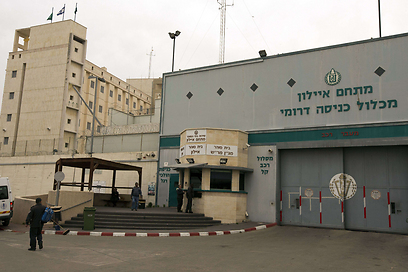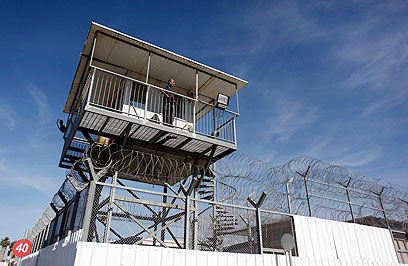
Legal official: Zygier affair may prompt indictments
Israel's legal system looking to point fingers in 'Prisoner X' affair. 'Had the judge who examined this case found nothing, she would not have turned the case over,' legal official says
With the investigation into the circumstances of Zygier's suicide still ongoing one question emerges – could anyone be blamed for his death?
Related stories:
- Report: Zygier planned to disclose info on Israel
- Dubai police chief denies contact with Zygier
- 1976 – 2010: The life and death of Ben Zygier
A senior official in the Justice Ministry said Thursday that the government is considering filing an indictment in connection to his suicide.
A court has already ordered an investigation into possible negligence in the handling of the dual Israel-Australian national's death.
ABC's 'Prisoner X' investigation
A statement written by the State Prosecutor's Office a day after Australian media uncovered the affair said that Rishon Lezion Magistrates' Court President Daphna Blatman Kedrai had chosen to turn the investigation into the cause of death over to the State Prosecutor's Office "to examine possible negligence."
"Had she found nothing suspicious she would not have turned the case over to us," the official said.
However, commenting on the possible effects the affair might have on Israel's future handling of similar cases, the official stressed that Israel would not change its conduct in dealing with prisoners such as "Prisoner X" both in regard to confinement conditions and to gag orders – when sensitive security matters call for such provisions.

Ayalon Prison (Photo: AFP)
He added that the picture painted by the media is far from reality. "There are no 'prisoners x' in the State of Israel," he insisted. "It's an expression taken from dictatorships where people were made to disappear without having seen a lawyer or family. There was no such thing here."
The official further added, "In the past 25 years there were very few cases in which it was decided for security reasons to hold prisoners under pseudonyms.
"In those cases, as in this particular case, the families were immediately made aware of the arrest and within a number of days the prisoner was given access to legal counsel. As in regular cases, there was due criminal process with the prisoner able to petition the court like any other inmate."
According to the official, what set the case of "Prisoner X" apart from other cases of solitary confinement was the change of name. This was done to safeguard national security, the prisoner's personal wellbeing and even his family's wellbeing, he claimed.
"In this specific case the prisoner consented to the name change," he stressed. The gag order too was necessary, he stressed. "The public's right to know was undermined in the interest of national security. The gag order was totally justified and it prevented damage," he explained.
Intelligence officials and former officials held a special meeting on Thursday to discuss the affair and minimize any damage caused to national security.
The official noted that the initial Australian report had included false information and that Israel's judiciary had acted swiftly to make public whatever possible. Within 24 hours a final statement was drafted, he said, remarking the relative speediness of the procedure given the limitations.
'Guards should have noticed'
Meanwhile, alongside the security services' self-examination, the Israeli Prison Service (IPS) is waiting anxiously for the results of an inquiry into possible negligence.
"If Yigal Amir's wardens managed to notice the bag he gave his wife, they should have noticed the suicide on time," a former IPS official told Ynet.
"The detainee was under strict observation. What happened should be looked into, whether the wardens could have prevented the suicide."
Zygier's cell was constructed especially to accommodate former Prime Minister Yitzhak Rabin's assassin Yigal Amir.
It is located in Block 15, which includes only the one cell.
Access to the cell is only through the prison yard, not through any other block. At the cell's entrance a room was built for the prisoner's wardens.
The cell itself is under camera surveillance, excluding the toilet.

'Strict observation is necessary' (Photo: Reuters)
"The wardens' responsibility is to guard the detainee. If he is in this cell, then obviously strict observation is necessary, not only to prevent his escape," the source said.
"It's true that if someone decides to end his life he will eventually do so," he admitted, "but the guards are supposed to prevent it. They must take care of the prisoners' safety."
Channel 10 released the transcript of the phone call between the prison and the Magen David Adom line after the suicide.
"This is Ayalon Prison, I need an ambulance immediately," said one of the guards.
"Listen, he hanged himself. We need an ambulance. I don't have details, I'll tell the medic to get back to you."
Zygier's suicide occurred in December 2010, at the peak of a suicide wave: In 2009 12 prisoners and detainees committed suicide, 13 in 2010.

Zygier's wedding in Israel
Following a special initiative by the IPS the numbers dropped to four in 2011 and three in 2012. Nevertheless, the IPS admitted it is impossible to completely prevent the phenomenon and the question what causes prisoners to end their own lives is still mostly unanswered.
'Isolation the no.1 cause for suicide'
According to attorney Rachela Erel, head of the Detainees and Prisoners Rights Clinic in the Israel College for Law and Business, the strongest factor leading to suicide is isolation.
"Cut off from the world, when no one knows who or where he is, a person who realizes he's buried alive, prefers to be buried dead," she explained.
Erel is the official Israel Bar Association comptroller of the IPS, appointed by the public security minister.
In May 2012 she petitioned the Knesset following prisoners' complaints on deaths within prison walls, after which a debate was held in the Special Committee for Public Petitions.
"Between May 2007 and May 2012, 158 prisoners died in Israeli prisons, 14 of whom committed suicide. The most serious aspect is that none of these deaths were investigated. The IPS appoints a committee to examine the prisoners' conduct, but not the reasons for the suicide," Erel said.
Erel has no doubt who is responsible. "The responsibility lies with the guards, with the IPS commissioner – he died under their watch.
"As an Israeli citizen I lament this situation. It's unacceptable, not in a country ruled by law. It shouldn't be that people die in dark cells, and no one knows what happened to them."
Aviel Magnezi, Raanan Ben-Zur and Shahar Chai contributed to this report
- Receive Ynetnews updates directly to your desktop










